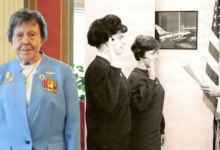Nightingale charity marks 90 years of nursing support

The organisation now known as the Florence Nightingale Foundation (FNF) was formally established on 5 July 1934 to carry on the work of the pioneering nurse whose name it bears.
The charity’s goal is to advance the study of nursing and promote excellence in nursing, midwifery and health visiting practice, with a focus on the importance of nursing and midwifery leadership.
“Nurses who do really well in their careers come across nay-sayers all the time. You learn never to accept ‘no’ as an answer”
Greta Westwood
The foundation launched the ‘FNF 90 at 90’ campaign in April this year to celebrate its 90th anniversary and raise money to support three cohorts of 90 nurses whom it will put through a leadership development programme.
In an interview with Nursing Times, FNF chief executive Professor Greta Westwood explained: “We are hoping to raise £90,000 to fund 90 student nurses and midwives, 90 early-career nurses and midwives, and 90 mid-career nurses and midwives from either health or social care. If we can do that by the end of the year, then we will have reached our 90 for 90 target.”
The FNF is also running a social media campaign to highlight 90 nurse and midwife leaders from the FNF community, representing a range of roles and settings, to raise the profile of the professions more broadly.
These include chief nursing officer (CNO) for England Dame Ruth May, CNO for Wales Sue Tranka and Emily Pimm, social care deputy manager at the St Monica Trust, who was chosen to be the lamp carrier at this year’s Florence Nightingale Commemoration Service held in Westminster Abbey on 15 May.
Other events the FNF is organising to mark its 90th anniversary include the inaugural Nightingale Fund lecture at the Royal Statistical Society, which will take place on 16 November or 21 December. These mark the dates in 1858 when Florence Nightingale was proposed, and then accepted, as the first female member of the society.
In September, the FNF will also launch a policy think tank that aims to bring together its existing policy work and provide a powerful platform for nursing and midwifery professionals to engage in health and care policy development, implementation and evaluation.
Nightingale herself remains an inspirational figure relevant to modern nursing in the eyes of Professor Westwood.
“I don’t think much has changed, frankly,” she said, pointing out that a lot of the hygiene practices that Nightingale pioneered during the Crimean War were more relevant than ever during the Covid-19 pandemic.
When Nightingale arrived at the Scutari Barracks with her team of 38 nurses in 1854 to tend to wounded soldiers, she was met with appallingly unsanitary conditions. She believed that these were responsible for more men dying from infectious illness than on the battlefield, and introduced hygiene measures that are still recognised as important today.
“She was the pioneer of sanitation post surgery,” Professor Westwood said. “She had no idea about germ theory of course, but she knew people were becoming infected through cross-infection because of their closeness to each other.”
However, it was her achievement in getting the powers-that-be to take her discoveries about sanitation seriously that Professor Westwood finds most inspirational.
Nightingale’s success came, in part, from her use of pioneering statistical diagrams to help illustrate the causes of death in soldiers in Crimea.
Her famous rose diagram of the shocking data on the causes of death in military hospitals, and the efficacy of her reforms at cutting death rates, showed the data in a way that was easy to understand, even for those with no statistics training.
However, due to the status of women at the time, even with data on her side, Nightingale was limited in what she could do on her own to enact reform.
Instead, she had to work via her male relatives to put pressure on the men who held the power – MPs, army officers and government officials.
“She never backed down until they agreed,” Professor Westwood said.
“She was very tenacious. She was like a terrier and never let go of anything until she got what she wanted.”
Professor Westwood added that this was a lesson from which any nurse looking to progress in their career could learn.
“Nurses who do really well in their careers come across nay-sayers all the time. You learn never to accept ‘no’ as an answer,” she said. “Anything is possible.”






